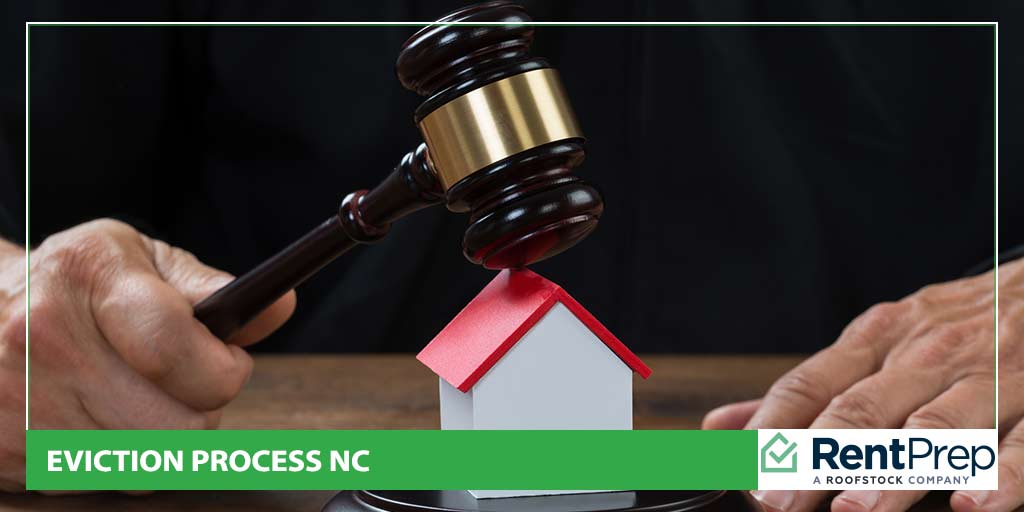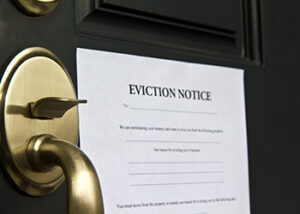
Working as a landlord is a simultaneously rewarding and demanding career. It’s great when you have tenants who are kind and pay rent in a timely manner; it’s less wonderful whenever you are fighting day-in and day-out for the rent that you are owed.
Unfortunately, dealing with situations like nonpayment of rent and lease breakers are going to be part of your job as a landlord. And that means that it is time for you to learn how to handle them the right way.
When dealing with how to evict a tenant in NC, landlords must be familiar with the letter of the law in order to be able to legally and efficiently reclaim control of their property. Without following eviction laws, you might find yourself spending months rather than weeks just to get the money that you are owed.
But what is the best way to learn about the eviction process NC currently works with? We know it can be hard to break down the latest rules and procedures, so we have created this guide to North Carolina eviction laws to help landlords like you be the best they can be even when dealing with the stress of an eviction situation.
A Table Of Contents For How To Evict A Tenant In NC
- Why Eviction Matters (And How To Avoid It)
- Eviction Process NC: The Basics
- How To Evict Someone In NC
- How Long Is The Eviction Process In NC?
- Evictions In North Carolina
Why Eviction Matters (And How To Avoid It)

Before we start focusing on the North Carolina eviction laws that are going to dictate how your eviction goes, let’s talk about eviction as a concept first.
Many landlords will do everything in their power to avoid ending up in an eviction situation. They might even go so far as to pay a tenant to move out! Unfortunately, that’s what it takes to avoid eviction sometimes.
But eviction isn’t always a bad thing. Sure, it takes a lot of time and mental energy to get through the process, but you are ultimately securing the future of your business through a regulated legal process. That kind of security can’t be found in every industry!
While there is always going to be a chance that a tenant turns out to be a problem down the line, keep in mind that you’ll be less likely to end up dealing with evictions if you take time and use a great screening service to help you have reliable tenants. Choosing tenants carefully can reduce the risk of you needing to file for eviction!
Eviction Process NC: The Basics
So, what is the eviction process in NC, and what do you need to know about it before you get started?
The process in North Carolina has the same basic structure as many other states:
- Decide why the tenant needs to be evicted.
- Send notice to the tenant.
- Wait for the notice period to pass.
- File for eviction.
- Go to the court hearing.
- Give writ of possession to local law enforcement.
- Get your property back!
That’s all there is to the overall eviction process in NC. It’s not too bad, right?
Of course, there’s more to be done in each step, but the general process makes a lot of sense and is easy to follow. The key when working through an eviction is to take your time and make sure you are filing all paperwork properly and at the correct time. Once we breakdown the process in more detail, you’ll know just when that is!
How To Evict Someone In NC
Now you’re probably wondering this: How do I start the eviction process in NC? With the guide we’re sharing today, there’s no need to stress. You’ll know how to evict a tenant in NC in no time!
We’ll break down the process into the seven parts we introduced above so you can get a complete picture of what to do every step of the way!
1. Decide Why The Tenant Needs To Be Evicted
The first thing that you need to do is figure out whether or not you have a legal reason for eviction. When you have signed a lease agreement with a tenant, they have a legal right to be on your property. So, even though you are the property owner, you cannot simply tell them to leave.
The reason for eviction must be a legal one. The most common reasons for eviction in North Carolina include:
- Nonpayment of rent
- Consistently paying rent late
- Lease violations (extra tenants, pets, smoking, etc.)
- Health violations
- Safety violations
- Illegal activity
Ultimately, you can evict someone if they are breaking the terms of your lease or endangering the property or its neighbors.
You cannot, however, evict someone simply because you don’t like them or because you don’t agree with their lifestyle. These would be considered personal attacks, and you have a responsibility to treat every single tenant, whether you personally like them or not, with respect. It is part of your job as a landlord, and that must be upheld even when you are frustrated.
2. Send Notice To The Tenant

Once you’ve determined the reason that you want to evict the tenant, you need to write up an eviction notice to send to them.
The notice must include the following information:
- Why the tenant is being evicted
- How long the tenant has to move out OR how long the tenant has to remedy the problem
- Tenant and property identifying information
It’s good to get specific when you are writing up an eviction notice. By clearly explaining what the problem is and how it can be resolved, you may be able to salvage the tenancy relationship.
In North Carolina, there are a few different notices that you might use when going through the eviction process. Which form you use will depend on the reason for eviction, so make sure that you are using the right one:
- 10-day Notice To Pay Or Quit
This form is used when a tenant has not paid rent. If they don’t pay or move out within 10 days, you can move to step 3.
- Leases About To Expire
If you’re working with a lease that’s about to expire and you don’t intend to let it renew, you will want to send out a 2-day, 7-day, or 30-day notice for all weekly, monthly, and yearly agreements respectively. These notices give tenants a reminder that they will need to move out soon.
- Other Lease Breaches
Generally, the 10-day notice to fix or quit is used for most lease problems in North Carolina, but the exact number of days required will be determined by the terms in your lease. Make sure that your lease specifies such terms for eviction.
Once you’ve written your notice, post it by certified mail to the tenant and drop off a copy in person as well to ensure that they receive it.
3. Wait For The Notice Period To Pass
The tenant now has the allotted amount of time to remedy the situation or move out. You might find that during this time a tenant will try to talk their way out of the eviction or pay you partial rent; don’t accept any partial payments.
Simply wait until the period is over, and then move on to step 4.
If you’re feeling antsy during this time, start collecting evidence for your potential court hearing so that you can prove your case when it comes time.
4. File For Eviction
If the tenant does not fix the problem or move out, it will be time to file for eviction at your local courthouse. Doing this requires a fee (usually under $100 depending on the jurisdiction) to be paid and a number of forms to be filled out. You’ll need to bring the information you need about the property, tenant’s basic info, and the situation going on right now.
Once you file the documents, the eviction will be in the court’s hands. They will collect the information they need from both parties and sent out a court summons. These documents are served by the county so that there is no question about who receives it. Both parties will receive no more than 7 and no less than 2 days’ notice.
5. Go To The Court Hearing
 At the court hearing, it will be your responsibility to prove the tenant should be evicted from your property. Prepare the documents and evidence you need to do just that. Make sure you have a copy of the deed, the lease, and all communication between the tenant and yourself ready to share with the judge.
At the court hearing, it will be your responsibility to prove the tenant should be evicted from your property. Prepare the documents and evidence you need to do just that. Make sure you have a copy of the deed, the lease, and all communication between the tenant and yourself ready to share with the judge.
Regardless of the outcome, both parties will have 10 days to appeal the ruling. Filing for an appeal costs additional money.
If an appeal happens, the tenant will still be responsible for paying rent on time, but the rent will be paid to the court and held in a type of escrow until the case is decided. Keep this in mind while working with an eviction, as you cannot always expect to start collecting rent again immediately.
6. Give Writ Of Possession To Local Law Enforcement
If the court rules in your favor, the tenant will then have 10 days to move out. If they do not move out by the end of this period, you can present your ruling to the local law enforcement. The constable will then let the tenant know it’s time to go and give them a few days.
If the tenant still doesn’t leave, the constable will padlock the door and remove them from the property.
7. Get Your Property Back!
Finally, your property is yours again! That means you can clean it up and get it ready for your next tenant.
But what do you do if the tenant’s belongings are still inside?
Often, tenants in eviction situations will leave their belongings behind. Legally, you cannot simply throw these items away without giving the tenant a chance to collect them.
In North Carolina, the tenant has 7 days to contact you about their belongings. After 7 days, it is your choice to sell them or dispose of them as you see fit. If the value of the items inside is less than $500, you only need to give the tenant 5 days to collect their belongings.
How Long Is The Eviction Process In NC?
Many landlords will be curious about the North Carolina eviction timeline as they start the process. Usually, the process takes about three to four weeks. You have to wait for the 10 day notice period, followed by the 7-day court summons period. Then, the tenant has up to 10 days to move out. Ultimately, you can expect to need a minimum of a month to take care of things.
For most landlords, a month without receiving rent from one of their properties is a big blow, but it would be an even bigger loss to not get rent from it for a few months if you let the tenant continually pay late or not pay at all!
While the process is long, stay patient and stick it out. In the end, you’ll have your property back again and be able to get back on track.
Evictions In North Carolina
There’s not a single landlord out there that wants to face an eviction situation, but the simple fact of the matter is that you will one day have to file for eviction. Rather than wait for that day to learn, it’s great that you’ve found this guide to help you begin to understand the process.
When it comes time for you to work through your next eviction filing and hearing, keep this guide on hand to ensure that you don’t miss any important steps along the way. And if you have any final North Carolina specific questions, Chapter 42 of the North Carolina Statutes and Laws book should be able to give you some answers!

